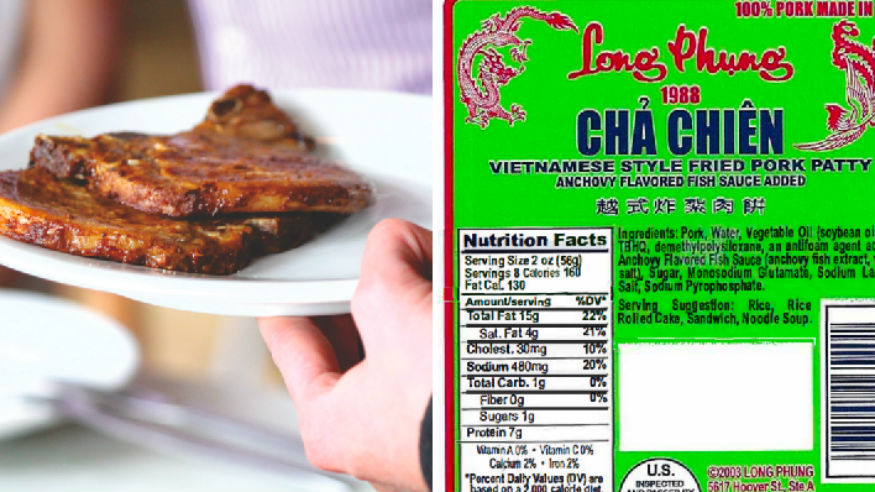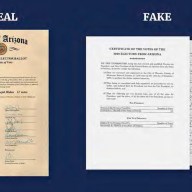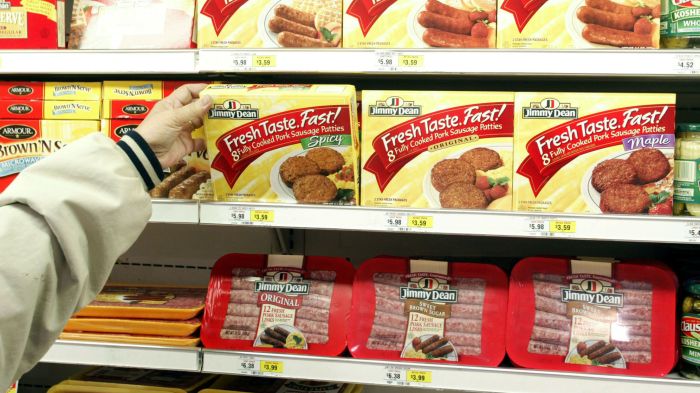When the CDC warned consumers about eating any kind of romaine this week, you probably ran straight to your fridge with trashcans ready. But, there was another FSIS and CDC report you might have missed amid the lettuce-disposing frenzy: a pork recall linked to an outbreak of Listeria.
165368 C. Corporation, known as the Houston-based Long Phung Food Products, recalled ready-to-eat pork patty rolls due to potential Listeria monocytogenes contamination.
“On October 22, 2018, FSIS was notified of a cluster of listeriosis illnesses that were closely related,” a news release from the FSIS reports. “Working in conjunction with the Centers for Disease Control and Prevention and state public health partners, FSIS determined that there is a link between the Listeria monocytogenes illnesses and ready-to-eat pork products produced by Long Phung Foods.”
So far, there are four reported cases of Listeria infection in a total of four states: Louisiana, Michigan, Tennessee and Texas. In all cases, infected people went to the hospital, but there are no reported deaths at this time.
Illnesses were confirmed on dates ranging from July 1, 2017 to October 24, 2018.
Long Phung Foods issused the recall on November 20, the same day the CDC announced an E. coli outbreak linked to romaine lettuce.
This is a Class I Recall, meaning there is “reasonable probability that the use of the product will cause serious, adverse health consequences or death.”
What are Listeria infection symptoms?
Listeria is a harmful germ that can hide in food products. The CDC says that Listeria outbreaks in the 1990s were primarily linked to deli meats and hot dogs. Now, outbreaks are usually linked to dairy and produce.
In early October there was a recall of ready-to-eat deli ham due to potential Listeria bacteria contamination. This separate outbreak resulted in four cases of illness and one reported death.
Similar to other foodborne illnesses, Listeria infection, or listeriosis, can cause fever and diarrhea. It primarily affects older adults, those with weakened immune systems and pregnant women.
When the infection becomes invasive (“beyond the gut”) pregnant women typically experience fever and other flu-like symptoms (fatigue and muscle aches). According to the CDC, Listeria infections during pregnancy can lead to miscarriage, stillbirth, premature delivery or “life-threatening infection of the newborn.”
People other than pregnant women experiencing invasive listeriosis have reported the following symptoms: headache, stiff neck, confusion, loss of balance and convulsions.
Symptoms of invasive listeriosis are usually reported between one to four weeks after eating contaminated food. Infection is treated with antibiotics.
In comparison to symptoms associated with the recent E. coli outbreak in romaine lettuce, a FSIS representative tells Metro the following via email:
E. coli O157:H7 is a potentially deadly bacterium that can cause dehydration, bloody diarrhea and abdominal cramps 2–8 days (3–4 days, on average) after exposure the organism. While most people recover within a week, some develop a type of kidney failure called hemolytic uremic syndrome (HUS). This condition can occur among persons of any age but is most common in children under 5-years old and older adults. It is marked by easy bruising, pallor, and decreased urine output. Persons who experience these symptoms should seek emergency medical care immediately.
For more on Listeria contamination prevention, click through to the CDC website.
Pork products recalled for Listeria infection
The recalled ready-to-eat pork patty rolls have the establishment number “EST. 13561” and were produced from May 21, 2018 through November 16, 2018. They were shipped to distributors and retailers nationwide, according to the FSIS.
The recalled products listed below are all sealed in “plastic vacuum packed packages” and contain a “single marinated roll.”
16-oz. “Long Phung 1988 GIO LUA” VIETNAMESE BRAND COOKED PORK PATTY ROLL ANCHOVY FLAVORED FISH SAUCE ADDED.
32-oz. “Long Phung 1988 GIO LUA” VIETNAMESE STYLE COOKED PORK PATTY ROLL ANCHOVY FLAVORED FISH SAUCE ADDED.
14-oz. “Long Phung 1988 CHA QUE” VIETNAMESE STYLE FRIED CINNAMON PORK PATTY ROLL ANCHOVY FLAVORED FISH SAUCE ADDED.
16-oz. “Long Phung 1988 GIO HUE” VIETNAMESE BRAND GARLIC & PEPPER PORK PATTY ROLL ANCHOVY FLAVORED FISH SAUCE ADDED.
32-oz. “Long Phung 1988 GIO HUE” VIETNAMESE COOKED PORK PATTY ROLL WITH GARLIC SEASONING ANCHOVY FLAVORED FISH SAUCE ADDED.
16-oz. “Long Phung 1988 CHA CHIEN” VIETNAMESE STYLE FRIED PORK PATTY ANCHOVY FLAVORED FISH SAUCE ADDED.
16-oz. “Long Phung GIO BI” VIETNAMESE BRAND COOKED PORK & PORK SKIN PATTY ROLL FLAVORED WITH ANCHOVY FLAVORED FISH SAUCE.
View product labels on the FSIS website.
If you find these products in your home, the CDC and FSIS both advise you to throw them away or return them to the store. Wash and sanitize the inside of your refrigerators and freezers as well.
Retailers should sanitize deli slicers and areas where the recalled products may have been prepared.
Contact your health care provider if you’ve consumed these products and experience symptoms.
PORK PATTY RECALL: Do not eat recalled Long Phung pork patty rolls labeled “EST. 13561,” usually found inside USDA mark of inspection. Return to store or throw it away. It’s linked to 4 Listeria infections in 4 states. https://t.co/ScqhYtZUmj pic.twitter.com/IhTQSbfyx9
— CDC (@CDCgov) November 21, 2018
“FSIS is continuing to work with federal and state public health partners to determine if there are additional illnesses linked to these products,” reads a statement, “and will provide updated information should it become available.”
Metro has also reached out to representatives from the CDC and Long Phung Foods for comment.



















